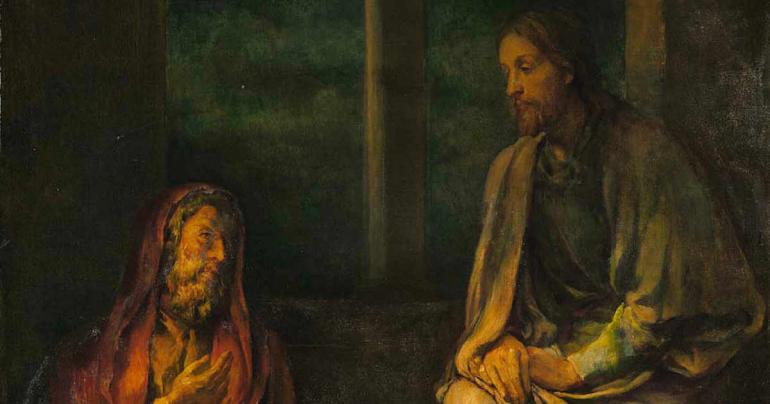A “Holy Push”

Nicodemus answered and said to him, ‘How can this happen?” Jesus answered and said to him, “You are the teacher of Israel and you do not understand this? Amen, amen, I say to you, we speak of what we know and we testify to what we have seen, but you people do not accept our testimony.” John 3:9–11
As we reflected upon yesterday, Nicodemus is one of the only Pharisees who ultimately converted, became a follower of Jesus, and is today considered a saint. The only other Pharisees who were recorded by name as converts to Christianity were Saint Paul and Gamaliel. Acts 15:5 also indicates that some other Pharisees ultimately converted.
When the many encounters between Jesus and the Pharisees are considered as a whole, it’s clear that there was great resistance among them toward Jesus and His teaching. They were constantly seeking to trap Him and, of course, ultimately were responsible for His death, along with other leading religious leaders from the Sanhedrin. For that reason, it’s easy to understand that there must have been great pressure upon all the Pharisees to reject Jesus. Each one of them would have felt the power of peer pressure to act in accord with the general view of Jesus’ condemnation. This is the context of this passage above in which Nicodemus questions Jesus. This passage continues yesterday’s Gospel conversation in which Jesus says clearly to Nicodemus that the way to Heaven is to be “born from above.” Nicodemus questions how one can “be born again,” and then Jesus issues this apparent criticism of Him quoted above.
It’s helpful to understand that Jesus’ criticism was not a condemnation of Nicodemus. It was not in the tone of His normal “Woe to you…” statements; rather, it was a gentle but very direct challenge to Nicodemus so as to move him from his questions to faith. And that’s the key. Nicodemus did not come to Jesus to trap and condemn Him like the other Pharisees did. Nicodemus came because he was confused. And most likely, he was confused because he felt great peer pressure from his fellow Pharisees to condemn Jesus.
Understanding this context should help us understand not only the goodness and courage of Nicodemus but also the loving boldness of Jesus. Jesus knew that Nicodemus was open. He knew that Nicodemus could be won over. But Jesus also knew that Nicodemus needed to be challenged in a direct and firm way. He needed a bit of a “holy push” so as to enter into the gift of faith. Of course, Jesus’ challenge ultimately won Nicodemus over.
Reflect, today, upon any way in which you, too, need a “holy push” from our Lord. What form of worldly pressure do you experience in life? Do friends, neighbors, family members or co-workers impose upon you in some way a peer pressure that is contrary to the life of true holiness? If so, ponder the ultimate courage of Nicodemus, Saint Paul and Gamaliel. Let their witness inspire you and allow our Lord to challenge you where you need it the most so that you, too, will receive the “holy push” that you need to be a more faithful follower of Jesus.
My Lord of all strength, You are unwavering in Your determination to challenge me in the area that I need it the most. Help me to receive your gentle rebukes of love when I am weak so that I will have the courage and strength I need to be a faithful follower of You. Give me clarity and understanding, dear Lord, and help me to overcome the misleading pressures of the world. Jesus, I trust in You.
Radio Veritas Asia (RVA), a media platform of the Catholic Church, aims to share Christ. RVA started in 1969 as a continental Catholic radio station to serve Asian countries in their respective local language, thus earning the tag “the Voice of Asian Christianity.” Responding to the emerging context, RVA embraced media platforms to connect with the global Asian audience via its 21 language websites and various social media platforms.














